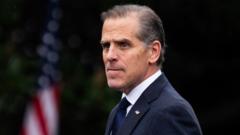The war in Gaza has prompted escalating accusations of war crimes against both Hamas and Israel, leading to a shift in support from traditional allies and calls for accountability.**
Evidence Mounts of War Crimes in Gaza, Allies of Israel Express Concern**

Evidence Mounts of War Crimes in Gaza, Allies of Israel Express Concern**
As the conflict continues, international allies are re-evaluating their support for Israel amid growing accusations of war crimes.**
Following the surprise attack by Hamas on October 7, 2023, the dynamics of the Israel-Palestine conflict have dramatically shifted, raising substantial allegations of war crimes from both sides. Prime Minister Benjamin Netanyahu's approach, which previously leaned toward managing Palestinian issues while confronting Iran, has come under scrutiny as Israel faces international backlash for its military actions in Gaza.
Historically, key players, including the U.S., had hoped to broker peace between Israel and Saudi Arabia, but the escalation of violence has shattered previous illusions. Netanyahu's refusal to conduct an inquiry into the intelligence and strategic miscalculations that facilitated the Hamas attack has only deepened the crisis.
The conflict's death toll has skyrocketed, with reports indicating that over 1,200 Israelis, primarily civilians, were killed during the initial Hamas onslaught, along with significant civilian casualties in Gaza due to retaliatory strikes. The International Criminal Court has issued arrest warrants for Netanyahu and his former defense chief over allegations of war crimes, while Israel decries these legal proceedings as unfounded anti-Semitic attacks.
Support from international allies is waning. Western nations, including the UK, EU members, Canada, and Australia, have expressed their condemnation of Israeli actions, emphasizing the humanitarian tragedy unfolding in Gaza. A joint statement highlighted the dire situation of civilians suffering from a harmful aid distribution model, describing it as dangerous and unjustifiable under international law.
David Lammy, UK’s foreign secretary, echoed sentiments in the House of Commons, but calls for more significant action, including recognition of a Palestinian state, remain limited by political calculations in Europe.
Amidst these tensions, Israel’s government faces internal pressures, with Netanyahu’s coalition on the brink of fracture due to disagreements over the conflict’s management. The advent of a summer recess in the Knesset may temporarily alleviate the threat of an immediate no-confidence vote; however, it also marks a critical period for negotiations on a potential ceasefire.
While a ceasefire could create an opportunity for dialogue and humanitarian pauses, the long-term peace prospects appear uncertain. As the war continues to evolve, the ramifications of international responses to alleged war crimes in Gaza may have lasting implications for global diplomacy and Middle Eastern relations.



















